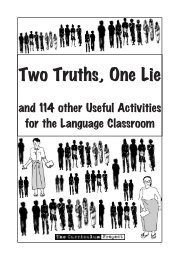Teacher's Guide - The Curriculum Project
Teacher's Guide - The Curriculum Project
Teacher's Guide - The Curriculum Project
- No tags were found...
Create successful ePaper yourself
Turn your PDF publications into a flip-book with our unique Google optimized e-Paper software.
International Trade (cont’d)Discussion1. Why do you think import tariffs might be useful for developing countries? Putstudents into groups of 3-5 people. Ask them to think about this question for a fewminutes. <strong>The</strong>n elicit one idea from each group in turn.Pre-teach: to compete (verb): to be in competition; to dominate (verb): to have a lot of controlover; liberalisation (noun): making more free, removing controls.Import tariffs and developing countries. Ask each student in turn to two or threesentences of the text. <strong>The</strong>n ask students to read through the text on their own. Elicitwords that they don’t know. Ask if they, or other students, can guess the meaning.If not, give them a dictionary to look it up and tell the class.Pairwork2. Multiple choice. Put students into pairs. Write the following multiple choiceexercise on the board. Give students time to complete the exercise and writedown the answers in their notebooks. Put students into new pairs and get them tocompare answers. Finally, elicit answers from students and check agreement withthe rest of the class.1. Import tariffs mean that some imported goods and services:a) become cheaper. b) become more expensive. c) are not allowed to enter the country.2. Some people think imports tariffs are good for developing countries because:a) they help them to import more goods. b) they help them to sell their goods to other countries.c) they help them to protect their economy.3. For Senegal, Uganda and Mexico, trade liberalisation has:a) created economic growth. b) created economic problems. c) stopped foreign imports.ANSWERS: 1:b 2: c 3: bOn Your Own3. Comprehension. Give students enough time to answer the following questionsin their notebooks. When they have finished, put them into pairs and ask them tocompare answers. Do they agree? Finally, elicit answers from students and checkagreement with the rest of the class. Below are the questions and guideline answers.1. Why do some people consider import tariffs good for developing countries?Answer: Some people consider import tariffs good for developing countries because they helplocal businesses to compete successfully against foreign imports.2. What do Japan, South Korea, China, Italy, Austria, Finland and France have in common?Answer: All these countries have successfully used import tariffs to boost economic growth.3. Why do the IMF and the WTO want import tariffs in developing countries to be reduced/removed?Answer: <strong>The</strong>y say that reducing or removing import tariffs will help the economies of thesecountries to grow.4. What happened when trade was liberalised in Senegal?Answer: One third of people working in the manufacturing sector lost their jobs.Groupwork4. Put the students into groups of 3-5. Get them to decide whether they would usetariffs and why/why not. If they would, ask them to write a list of a few goods thatthey would apply the tariffs to. Discuss ideas in class.<strong>The</strong> <strong>Curriculum</strong> <strong>Project</strong> ECONOMICS: an introduction - Teacher’s <strong>Guide</strong>57













![[Eng] Nov 2012 DRAFT - The Curriculum Project](https://img.yumpu.com/45590859/1/184x260/eng-nov-2012-draft-the-curriculum-project.jpg?quality=85)


